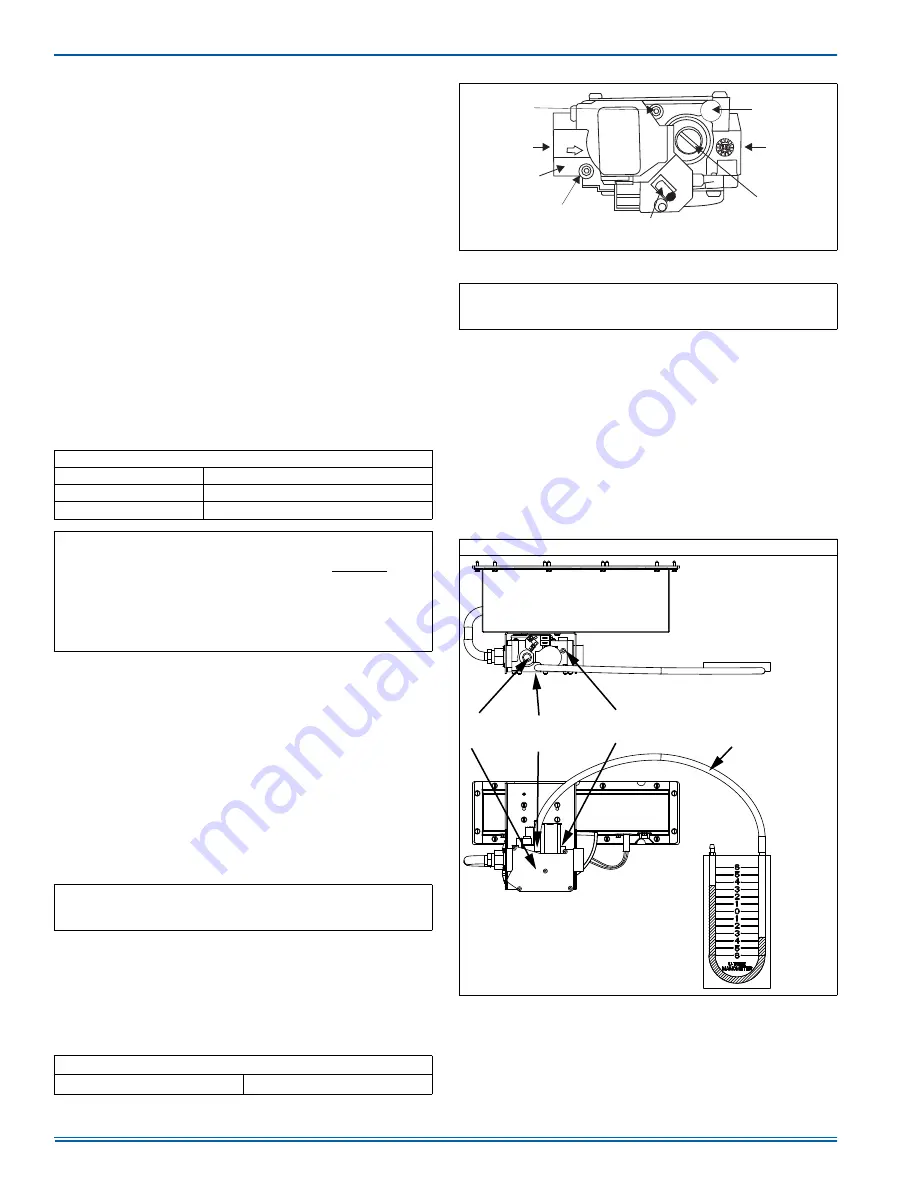
5894307-UIM-B-0920
26
Johnson Controls Ducted Systems
ADJUSTMENT OF MANIFOLD GAS PRESSURE AND
INPUT RATE
Inlet and manifold gas pressure can be measured by connecting the U
tube manometer to the gas valve with a piece of tubing. Follow the
appropriate section in the instructions below. See Figure 30 for the loca-
tions of the pressure ports on the gas valve.
Turn gas off at the ball valve or gas cock on gas supply line
before the gas valve. Find the pressure ports on the gas
valve marked Out P and In P.
1. The manifold pressure must be taken at the port marked OUT P.
2. The gas line pressure must be taken at the port marked IN P.
3. Using a 3/32 in. (2.4 mm) hex head wrench, loosen the set screw
by turning it one turn counter clockwise. DO NOT REMOVE THE
SET SCREW FROM THE PRESSURE PORT.
Read the inlet gas pressure
Connect the positive side of the manometer to the IN P tap on the gas
valve. Do not connect any tubing to the negative side of the manometer,
because it references atmospheric pressure. See Figures 30 and 31 for
connection details.
1. Turn on gas and electrical supplies and follow the operating instruc-
tions to place the unit back in operation.
2. Once the correct gas inlet pressure has been established (see
Table 13), turn the gas valve to OFF and turn the electrical supply
switch to OFF. Remove the flexible tubing from the gas valve pres-
sure tap and tighten the pressure tap plug using the 3/32 in. (2.4
mm) hex head wrench.
3. Turn on the electrical and gas supplies, and with the burners in
operation, check for gas leakage around the gas valve pressure
port using an approved non-corrosive gas leak detection fluid or
other non-flammable leak detection methods.
Read the manifold gas pressure
Connect the positive side of the manometer to the OUT P tap on the
gas valve. Do not connect any tubing to the negative side of the
manometer, because it references atmospheric pressure. See Figures
30 and 31 for connection details.
1. See Figure 30 for location of pressure regulator adjustment cap and
adjustment screws on main gas valve.
2. Turn on gas and electrical supplies and follow the operating instruc-
tions to place the unit back in operation.
3. Adjust manifold pressure by adjusting gas valve regulator screw for
the appropriate gas per the following:
4. After the manifold pressure has been adjusted, re-calculate the fur-
nace input to make sure you have not exceeded the specified input
on the rating plate. See the CALCULATING THE FURNACE INPUT
section.
5. Once the correct BTU (kW) input has been established, turn the
gas valve to OFF and turn the electrical supply switch to OFF.
Remove the flexible tubing from the gas valve pressure tap and
tighten the pressure tap plug using the 3/32 in. (2.4 mm) hex head
wrench.
6. Turn on the electrical and gas supplies, and with the burners in
operation, check for gas leakage around the gas valve pressure
port using an approved non-corrosive gas leak detection fluid or
other non-flammable leak detection methods.
Table 13:
Inlet Gas Pressure Range
INLET GAS PRESSURE RANGE
Natural Gas
Minimum*
4.5 in. W.C. (1.12 kPa)
Maximum
10.5 in. W.C. (2.61 kPa)
IMPORTANT:
The inlet gas pressure operating range table specifies
what the minimum and maximum gas line pressures must be for the
furnace to operate correctly. The gas line pressure
MUST BE
a mini-
mum of:
• 7 in. W.C. (1.74 kPA)
This is in order to obtain the BTU input specified on the rating plate
and/or the nominal manifold pressure specified in these instructions
and on the rating plate.
IMPORTANT:
The cap for the pressure regulator must be removed
entirely to gain access to the adjustment screw. Loosening or tighten-
ing the cap does not adjust the flow of gas.
Table 14:
Nominal Manifold Pressure
NOMINAL MANIFOLD PRESSURE
Natural Gas
3.5 in. W.C. (0.87 kPa)
Figure 30:
Gas Valve
IMPORTANT:
If gas valve regulator is turned in (clockwise), manifold
pressure increases. If screw is turned out (counterclockwise), mani-
fold pressure decreases.
MANIFOLD PRESSURE U TUBE CONNECTION
Figure 31:
Reading Gas Pressure
INLET
WRENCH
BOSS
INLET
PRESSURE
PORT
ON
OFF
ON/OFF SWITCH
(Shown in ON position)
MAIN REGULATOR
ADJUSTMENT
OUTLET
OUTLET
PRESSURE
PORT
VENT PORT
BURNER
BURNER
¼" TUBING
3.5" W.C.
GAS
PRESSURE
SHOWN
GAS
VALVE
MANIFOLD
PRESSURE TAP
INLET
PRESSURE TAP
A1132-001









































